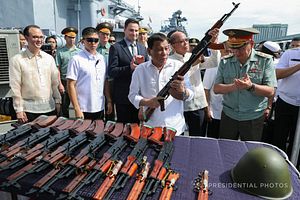Last week, the Russian ambassador to the Philippines held a meeting with Philippine President Rodrigo Duterte. The meeting, which came in the aftermath of deadly twin bombings in the southern Philippines, touched on the shared counterterrorism challenge for both sides, which has been factoring into their limited but growing defense relationship in recent years.
As I have observed previously in these pages and elsewhere, one of the consequences of Duterte’s so-called independent foreign policy, which seeks to boost the country’s outreach with countries like China and Russia, has been the slow but sure development of Russia-Philippine defense relations, despite the challenges that still exist. We have already seen a number of developments take place over the past few years, including naval visits, transfers of equipment, and even talk of new exercises within the context of several general functional areas including maritime security and counterterrorism.
Indeed, just in October 2018, we finally witnessed another notable first in the Russia-Philippine defense relationship after months of speculation with the first-ever port visit by a Philippine Navy ship to Vladivostok in Russia, following visits made by Moscow prior to that. Early last month, Russian vessels paid another scheduled goodwill visit to the Philippines in the first public defense engagement between the two sides to kick off 2019.
Last week, the counterterrorism aspect of Russia-Philippines defense ties was in the spotlight again during a meeting between Russian Ambassador to the Philippines Igor Khovaev and Philippine President Rodrigo Duterte. Khovaev had paid a courtesy call on Duterte on the afternoon of January 31, as part of a series of interactions between the two sides that followed the deadly twin bomb attacks in Joko in the southern Philippines. That attack once again reinforced the centrality of the counterterrorism challenge for Manila into 2019.
While the discussions between Khovaev and Duterte were wide-ranging, counterterrorism was among the issues on the top of the agenda. According to the account by Presidential Spokesperson Salvador Panelo, Khovaev reiterated Russia’s condolences for the deaths caused, condemned terrorism, and reaffirmed his country’s commitment to help the Philippines combat terrorism. This followed Russian President Vladimir Putin’s message to Duterte noting that Moscow was willing to step up cooperation with the Philippines to combat terrorism and violent extremism.
The two sides also discussed the state of their defense ties more generally. Per the statement, Khovaev restated Russia’s commitment to strengthen Philippine defense capabilities, while Duterte, on the Philippine side, also said he was committed to further expand and deepen cooperation with Russia.
Unsurprisingly, the specifics of that collaboration were not publicly disclosed by either of the two sides. As 2019 progresses, we may get a better sense of how counterterrorism as a priority factors into the broader defense relationship that both sides have been looking to build out over the past few years.
































